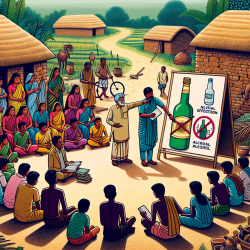The alarming rise in alcohol consumption among adolescents from indigenous tribes in India has become a pressing issue that demands immediate attention. The recent study titled "A Three-Site Study of Alcohol Consumption among Adolescents from Indigenous Tribes in India" sheds light on this growing concern and presents actionable insights for practitioners looking to make a difference.
The Scope of the Problem
Alcohol use disorder is not just a global problem; it is particularly severe among indigenous tribes in India. Despite making up 8.6% of the Indian population, these communities are often geographically isolated and socioeconomically underdeveloped. The study conducted across three states—Tamil Nadu, Meghalaya, and Gujarat—aims to estimate alcohol use and psychiatric morbidity among teenagers from these tribes.
Key Findings
- The study revealed escalating alcohol use among tribal communities.
- Phase 1 involved a cross-sectional study using the MINI 6.0/MINI Kid 6.0 questionnaire to assess psychiatric morbidity and substance addiction.
- Phase 2 was an intervention trial using the NIMHANS Life Skills Education (LSE) module to protect adolescents from alcohol use.
The Role of Life Skills Education
The NIMHANS LSE module emerged as an effective tool to empower adolescents and promote mental well-being. By improving self-management skills and decision-making abilities, this module can help forestall alcohol use among adolescent tribals.
Why Life Skills Education Works
- It focuses on developing cognitive behavioral skills crucial for resisting peer pressure.
- The module includes elements of the Adolescent Community Reinforcement Approach (ACRA).
- It has been field-tested for efficacy among adolescents with substance use issues.
Implications for Practitioners
For practitioners working with indigenous communities, this study offers valuable insights into implementing life skills education as a preventive measure against alcohol use. Here are some steps practitioners can take:
- Implement Life Skills Training: Incorporate NIMHANS LSE modules into existing programs to empower adolescents.
- Cultural Sensitivity: Customize interventions to align with cultural beliefs and practices of indigenous communities.
- Community Involvement: Engage community leaders and members in planning and executing interventions.
- Continuous Monitoring: Follow up with participants to assess long-term effectiveness and make necessary adjustments.
The Need for Further Research
This study highlights the need for further research to explore additional protective factors against alcohol use among tribal adolescents. By understanding cultural contexts and involving indigenous people in research efforts, we can develop more effective strategies to combat this issue.
A Three-Site Study of Alcohol Consumption among Adolescents from Indigenous Tribes in India










